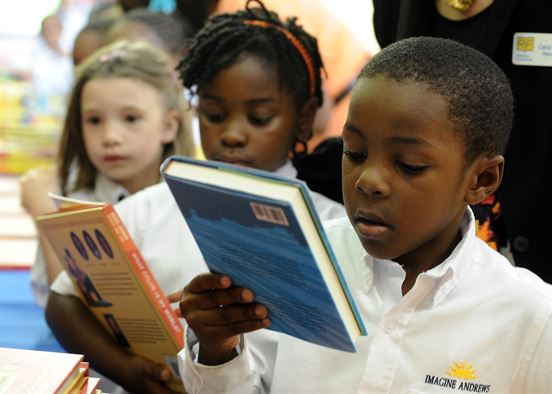8 Great Ways to Get Kids to Read More
Maybe it's somewhere in their DNA. Some kids just want to learn to read. They need to know what those letters spell and how they sound when put together. Other kids - not so much. And yet we want them all to become readers - good readers.
So, what do we do with those reluctant? How can we motivate them to want to read? Because it is, after all, a matter of motivation. They, just like us, want to spend time on those things that they like - those things they find enjoyable and thus worth their time. We always find time for the things we like to do - so do kids. The key, then, is to make reading something that kids want to do, not something they "have" to do. Here are 8 tips that may promote that "want to read."
1. Reading Material Based Upon Personal Interest
Parents know their children better than anyone else. They know what excites and interests their kids. Finding reading materials that relate directly to those interests is a big step toward motivation. Start with materials that have lots of images with a small amount of text - even comic books of favorite superheroes will work here. Read the text to your child, and then ask them to read it too. Ask questions. "What is Captain America saying to the Hulk?" "What is Mulan saying to her father?"
2. Use Technology Smartly
You may have to "kiss a lot of toads" to find the prince that works here. There are so many reading software programs, apps, and online sites that promote reading skills. You may love some of them, but your reluctant reader may not. You have to continue to experiment with them and to assess the level of interest your kiddo has. Don't give up keep trying until you find the programs or apps that excite your reader.
3. Use Audio-Books
This is a huge tip for teachers. If you have struggling readers, understand that they are uncomfortable and may be embarrassed that they cannot read as well as their peers. Giving them audio books allows them to keep up, to continue to learn vocabulary, and to continue to gain world knowledge.
4. Turn on Closed Captioning
If your kiddo watches a lot of kids' shows, either educational or for fun, turn on the closed captioning. The reason is this: their eyes will be drawn to the words on the screen. Parents can then read along with that captioning too. Kids can see the connection between what they hear and see, and they can see that printed words have meaning.
5. Read Aloud - Parents and Teachers
During the early years, children need to see and hear words. They need to connect words with sounds. Reading aloud does this. The verdict has been in on this for a long time. Supreme dissertations have been produced over many years that show a major correlation between reading aloud to kids and kids' reading development. Teachers in early childhood classrooms do this often. Parents need to do this daily to - all of the research supports it. And start discussions during that reading. Let your kid wonder, develop opinions, and do some critical-thinking and problem-solving.
6. Consider Poetry
Humorous poetry can be a big motivator, a source of new vocabulary and ideas too. Parents may be surprised at the role that funny poems can play - just look at Dr. Seuss books. Many reluctant readers "take" to poetry. It doesn't "feel" like a reading lesson - it's short and fun. Don't count out poetry until you have tried it.
7. Reading Materials and Modeling in the Home
Again, the research is in. When parents read and kids see their parents reading, they see it as valuable. And including them in discussions of what is read can be a great tool for an older elementary child. The research clearly states that, when reading occurs regularly in the home, children in those homes have higher academic achievement.
Reading materials at the child's level should be all over the place, and they should change often - on tables, on the kitchen table, in the bathroom, and in the bedroom. If parents can't afford to buy reading materials, they have libraries; there are also an amazing number of used bookstores to pick up high-interest reading stuff.
8. Promote Interest in Series
Just as parents have favorite authors, students can develop those favorites too. Once you know your child's interest areas, see if you can't find book series by an author who speaks to those interests. Looking forward to the next book in a series is a big motivator.
The reluctant kid is a challenge, but don't give up. Be engaged in reading and remember that the best examples for children are their parents and teachers: if you show your true love of literature, children will be interested in the reading as well. It may not be easy to inspire a reluctant to become an aficionado - it's a process and there is no "magic bullet." It takes a lot of experimentation of sorts until the right triggers are found. Maybe they will be found in the books.
Guest Blogger: Nelma Lumme is a freelance blogger and enthusiastic educator from Chicago, IL. Her hobbies include cinema, jogging, psychology and blogging about education, writing, self-improvement, and psychology.
Search Internet4Classrooms

Custom Search







